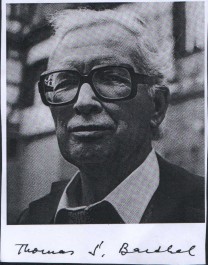Barthel was born on Jan 4th, 1923 in Berlin as son of Max Barthel, a socialist poet.
In WWII Barthel worked as decoder for the German Forces - his later scientific interest in deciphering sign systems is certainly related.
In 1946 he studied Völkerkunde in Berlin with Richard Thurnwald and Sigrid Westphal-Hellbusch, as well as Geography with Albrecht Haushofer. In 1949 he studied Ethnology in Leipzig with Julius and Eva Lips. Finally, he moved to Hamburg (to study with Franz Termer), where he finished his PhD in 1952 on the Dresden Maya Manuscript. Together with Ursula Schlenther, Wolfgang Haberland and Günter Zimmerman, Barthel formed part of the so called Hamburg School of Old Americanists.
In 1957/58 he carried out field research in Atacamenos/Chile, as well as on Easter Island. In 1965/66 Bathel worked in Mexico, 1970 in Peru.
He habilitated in Hamburg (1957/58) on the Easter Island Scripture (Rongorongo) and in 1959 he received a call to Tübingen University as an extraordinary professor.
Form 1964 to 1988 he led the new Institute for Ethnologie in Tübingen. After the traumatic GAA-Conference of 1969 in Göttingen (which was partly related to the accusations of german complicity with the genocide on brazilian indians), Barthel chaired a commission to shed light on the accusations.
Barthel died in April 3rd, 1997 in Tübingen.
Most important works:
- The Eighth Land: The Polynesian Discovery and Settlement of Easter Island (Orig.: Das achte Land: Die Entdeckung und Besiedlung der Osterinsel nach Eingeborenentraditionen übersetzt und eräutert). Thomas Barthel. Munich: Klaus Renner, 1974. 387 pp., DM82 (cloth).
(English version based on BAA/Prof. Riese)



